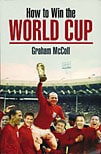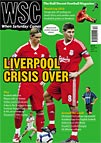 by Graham McColl
by Graham McColl
Bantam Press, £12.99
Reviewed by Jonathan O'Brien
From WSC 280 June 2010
By the law of averages, a sizeable number of you who are reading this will be having a flutter on the World Cup. So, before you put your money down on Spain (who are forever only one Sergio Ramos backpass away from potential disaster), or Brazil (whose star playmaker has endured a poor season), or even England, have a leaf through this entertaining look back through World Cup history that passes itself off as an instruction manual for managers hoping to bring home the big one.



